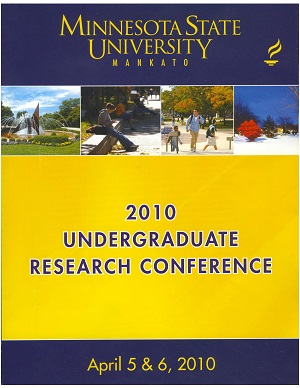The Relationship between Proactive Personality and Recovery Experiences
Location
CSU 201
Start Date
6-4-2010 10:00 AM
End Date
6-4-2010 12:00 PM
Student's Major
Psychology
Student's College
Social and Behavioral Sciences
Mentor's Name
Lisa Perez
Mentor's Department
Psychology
Mentor's College
Social and Behavioral Sciences
Description
Recovery is the way in which an individual unwinds from performing some type of work, for instance, at the end of a work day or work week. Proactive personality is characterized by a desire for control, good organizational skills, and the ability to adapt to various surroundings. The current study examined the relationship between recovery from work-related stressors and proactive personality and these two factors relate to strain outcomes such as need for recovery. This study specifically evaluated workload as a job stressor that necessitates recovery processes by individuals. We then examined whether engaging in specific recovery experiences (e.g., relaxation or mastery experiences) and specific personality traits (e.g., proactive personality) moderated the relationship between workload and strain outcomes (e.g., need for recovery).
Individuals with proactive personalities may respond to stressors and approach recovery from stressors differently than those who are not proactive. Thus, we anticipated that there would be a weaker relationship between workload and need for recovery among those with proactive personalities than among those without proactive personalities. We also hypothesized that individuals with proactive personality would be more likely to engage in mastery experiences as a recovery technique as opposed to detachment and relaxation during the recovery process. Furthermore, we explored the possibility that these recovery experiences might moderate the relationship between workload and need for recovery. A survey assessing each of these constructs was given to approximately 100 full-time working adults. Data collection is underway. Results, theoretical and practical implications, and limitations will be discussed.
The Relationship between Proactive Personality and Recovery Experiences
CSU 201
Recovery is the way in which an individual unwinds from performing some type of work, for instance, at the end of a work day or work week. Proactive personality is characterized by a desire for control, good organizational skills, and the ability to adapt to various surroundings. The current study examined the relationship between recovery from work-related stressors and proactive personality and these two factors relate to strain outcomes such as need for recovery. This study specifically evaluated workload as a job stressor that necessitates recovery processes by individuals. We then examined whether engaging in specific recovery experiences (e.g., relaxation or mastery experiences) and specific personality traits (e.g., proactive personality) moderated the relationship between workload and strain outcomes (e.g., need for recovery).
Individuals with proactive personalities may respond to stressors and approach recovery from stressors differently than those who are not proactive. Thus, we anticipated that there would be a weaker relationship between workload and need for recovery among those with proactive personalities than among those without proactive personalities. We also hypothesized that individuals with proactive personality would be more likely to engage in mastery experiences as a recovery technique as opposed to detachment and relaxation during the recovery process. Furthermore, we explored the possibility that these recovery experiences might moderate the relationship between workload and need for recovery. A survey assessing each of these constructs was given to approximately 100 full-time working adults. Data collection is underway. Results, theoretical and practical implications, and limitations will be discussed.
Recommended Citation
Doerr, Heidi. "The Relationship between Proactive Personality and Recovery Experiences." Undergraduate Research Symposium, Mankato, MN, April 6, 2010.
https://cornerstone.lib.mnsu.edu/urs/2010/oral-session-09/3




